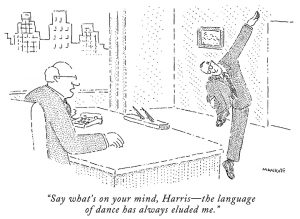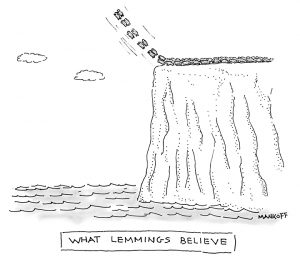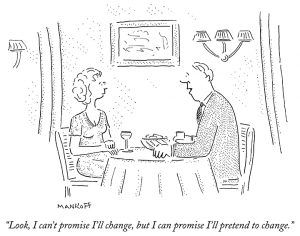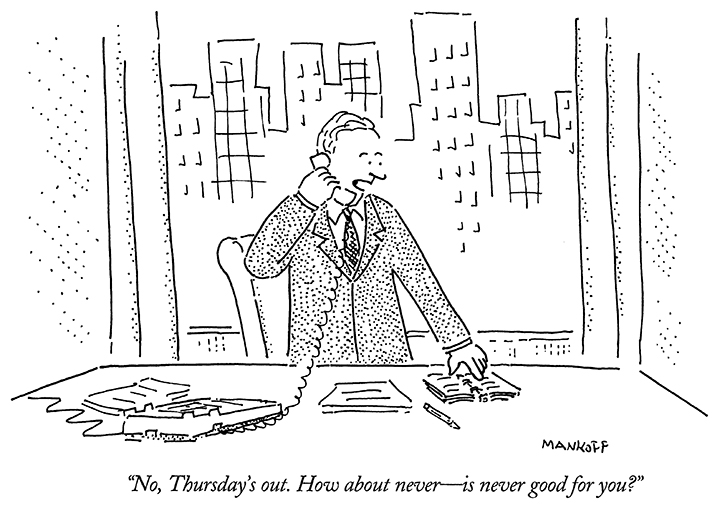Bob Mankoff, longtime cartoonist and former cartoon editor of The New Yorker magazine, and currently the cartoon and humor editor at Esquire, is teaching a course on humor and communications this semester in the Department of Communication and Media Studies. He sat down with screenwriter and Fordham lecturer Jim Jennewein to talk about cartoons, the history of stand-up, and comedians delivering hard news.
 Jim: Tell us about your course.
Jim: Tell us about your course.
Bob: We’re exploring this idea of how we use humor, not just for entertainment but to communicate in personal relationships, in advertising, in persuasion, in all of the ways we use humor in addition to entertainment. I think that’s actually the most important part of humor.
Jim: So, humor is a communication tool?
Bob: Sometimes it is used in communication to say things we ordinarily couldn’t say. Because in humor we can say “Hey I was only joking!” Often people have different agendas. You don’t know the other person’s agenda, they don’t know yours. So, one part of humor is social probing. Are you playful? Is your mind flexible? If you tell a joke on a certain topic, I can tell pretty quickly if you are liberal or conservative by who you’re making fun of. So there are all these dynamics that go into the use of humor in life and in communication.
Jim: Has stand-up created a new lexicon in comedy?
 Bob: Yes, it has. And it’s one of our strongest forces now in comedy: stand-up as a means of communication, as a means of expression and as art form. The history of stand-up probably comes from [monologues that were done in] vaudeville.
Bob: Yes, it has. And it’s one of our strongest forces now in comedy: stand-up as a means of communication, as a means of expression and as art form. The history of stand-up probably comes from [monologues that were done in] vaudeville.
Jim: There were ethnic comics in vaudeville who did accents of the immigrant classes.
Bob: Oh yeah, there was all of that. This is terrible, but I have to say there was the Jew routine: the heeb; the Irish routine: the mick; and Italian: the wop. These are all obviously ethnic insults. But that’s what these routines were called. And there were worse that I won’t go into, but it was partly a heterogeneous society’s way of dealing with its own immigrant conflicts rather than killing each other. Epithets aren’t good but they are much preferable to extermination.
Jim: Right, it was a way to process the dissonances and the conflicts of having a hundred different ethnicities in one city or in one country.
 Bob: And that comes right out of vaudeville. But our ideas about humor have changed, in that we want to feel more participatory. You know, back then in Henny Youngman’s “Take my wife—please,” you’re not really participating.
Bob: And that comes right out of vaudeville. But our ideas about humor have changed, in that we want to feel more participatory. You know, back then in Henny Youngman’s “Take my wife—please,” you’re not really participating.
Jim: You’re letting the jokes wash over you.
Bob: And he took that form to its extreme, like, “I’ve got an encyclopedia of jokes, just sit back, if you don’t like one, I’ll give you another, and another.”
Jim: And we knew the persona was a construct.
Bob: Right, right. We knew none of it was true. But we know that when Louis C.K. is talking about race, he’s actually making a point. He has a routine where he starts off saying, “Oh man, I don’t know, I’m bummed. I don’t know why. I’m white. I mean I’m not saying white is better, I don’t think I’m better, I’m just saying it’s better to be white.” Part of that is exaggeration or fanciful, but he’s making a point. And then he goes on to say, “…and I’m a man.” He’s touching on a truth, and he’s also talking about his conflicts.
 Jim: We’ve become increasingly reliant on comedians to deliver very serious truths, like what’s happening in the news. What are your thoughts on that?
Jim: We’ve become increasingly reliant on comedians to deliver very serious truths, like what’s happening in the news. What are your thoughts on that?
Bob: We now have people getting serious content through comedy; of course John Stewart, and now John Oliver, Steven Colbert, Trevor Noah. And you know that is definitely a real shift, but it goes back a little ways. There was Mark Twain and Will Rogers, for example. What we have now is humor as a kind of rhetoric. And of course, to some extent the politicians are doing the work for you because you have them on video contradicting themselves. But what this means is that humor has become part of the armamentarium of argument. And this is where we come to persuasion. And the question of how much does it persuade? In the end, I think you can only really persuade through real argument although humor can be a way in to let you do that.
The default condition in life is seriousness. Serious argument, logical argument, that’s how we have to live our lives. Humor is the icing on the cake. And the truth is, cakes without icing are lousy.


